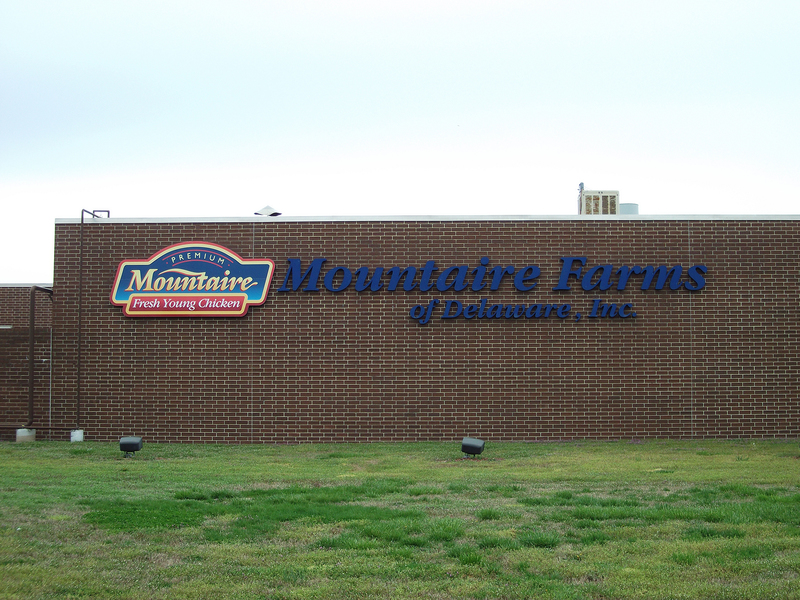Homeowners near the Mountaire Farms chicken plant in Millsboro say the plant emits terrible odors. Officials from the plant argue they have buffered the area surrounding the facility to keep the smell from wafting into neighboring homes.
About 25 people attended a Delaware Department of Natural Resources and Environmental Control public hearing on an application from Mountaire to add two thermal oxidizers and three room air scrubbers – all designed to control air pollution and odor – to its Resource Recovery Plant application. The company also seeks to increase throughput by 70 percent, according to testimony opposing the extension.
Mountaire Engineering and Environmental Services Director John Wren attended the Oct. 16 hearing with officials from DNREC Division of Air Quality. Wren said Mountaire began construction of its Resource Recovery Plant two years ago. He said the plan makes Mountaire the most energy-efficient and environmentally friendly chicken processing plant in the United States. “And possibly the world,” Wren said.
Mountaire now uses 34 percent less energy than a typical plant, he said. The building is designed to maintain negative pressure, meaning when a door opens, air comes into the building, but no air is released from the building, Wren said.
The plant has also invested $2.5 million on thermal oxidizers to control odor leaving the plant, Wren said.
Beth Sise, Mountaire Farms environmental manager, said the plant has invested $3.5 million into wastewater improvements, and nitrogen in the wastewater has been reduced by 75 percent in the last year.
There is no direct discharge of wastewater from the plant into the Indian River, Sise said.
A handful of Millsboro and Dagsboro residents spoke at the hearing, saying Mountaire’s efforts have done little to control odor.
Dorothy LeCates said she remembers when the plant first opened in 2000, and officials promised to plant trees as buffers to block odors.
“I live directly across that river from the plant,” she said. Some nights, LeCates said, she can smell odor from the plant in her dining room while trying to eat dinner. Other times, she said, she can smell it while mowing her front lawn. “It’s not a constant smell; it comes and goes,” she said.
In 2000, LeCates said, she was also told the plant would be monitored by DNREC for compliance, and property owners would not need to monitor the plant themselves. DNREC officials do not monitor the plant regularly, LeCates said; they respond only to complaints.
LeCates also said she has recorded at least two nights – both Mondays – when she and her neighbor have heard loud rumbling they say is also coming from Mountaire. “These have been like Earth tremors,” she said.
Wren said buffers were planted in 2000 to control the smell. “We have at least – more than – the buffers that are required,” he said.
Wren said Mountaire monitors itself, and computers notify operators of any imbalance in the system. “The entire plant is computerized,” he said.
Wren said he would look into the rumbling sound. “I don’t know why there would be a noise on Monday night, as opposed to any other night,” he said.
Cindy Wilton, who lives in Possum Point, also said the smell was bothersome. “My health is at risk when that smell is there,” she said. “It’s disgusting.”
Wilton said residents complain, but by the time an official from DNREC goes to the plant to investigate, the odor is gone.
Dagsboro resident Ken Currie said other states organize and train citizens to monitor similar projects. He asked if DNREC could train a group of citizens to monitor Mountaire.
Paul Foster, DNREC’s program manager for air inspection, said because of the level and type of emissions, a citizens group would not be able to monitor the plant.
Chuck Schonder asked why Mountaire was requesting a 70 percent increase in throughput in its application.
Wren said throughput is the tonnage of raw material – blood, feathers and claws – that are processed through the facility in a rolling 12-month period. He said Mountaire based its throughput request on running the plant 24 hours a day, seven days a week, even though the plant would not run that often.
Schonder asked Wren to reveal Mountaire’s predictions for 2014 production, to explain the 70 percent increase.
“I can’t answer that,” Wren said.





















































